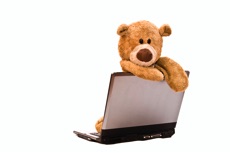Children and Online Safety
How can I protect my child in the online world?
Many of us are baffled by how powerfully online social networks pull in our children. Kids use Facebook, Myspace and other sites to connect with friends, classmates and people with similar interests. Over half of all teens check their online profiles on these websites more than once a day; every fourth child does so more than 10 times a day.
The reason for this pervasive involvement seems quite simple. The online world offers a child the opportunity to wear different hats. From behind a screen, it's quite possible to be someone else, and figure out who one really is or who one wants to be. Thus, these sites provide an opportunity to connect in a way a child may not feel comfortable doing otherwise.
The absence of face-to-face interaction also provides the child with a safe haven, where blushing, or similar embarrassing moments are veiled. The child can feel upset with a comment or exhilarated with a returned affection or compliment, and still be 'unseen.' Similarly, the child can take time to respond to a challenging situation, which, were it offline or in the real world, would have to be spontaneous. Finally, for most adolescents, it is much easier to talk about things when there is no obligation to make eye contact.
On the flip side, this anonymity also leads to a lack of accountability. One can easily disguise one's own identity and pose as someone else, or hack into someone else's social network and pose as that person. It is now too often happening that a child exposes himself by sharing private information. This often leads to painful consequences, such as cyberspace bullying or dissemination of private information or both.
Parents and caregivers can be more effective in protecting their children from the perils of the online world than they believe themselves to be. Research has proved that children raised in families who have at least one meal a day together are less likely to have drug and behavioral problems. It is not the food they eat, but the time they share together. This same concept applies here. Unfortunately, a recent survey showed that parents often underestimate their children's online activities and are unaware of what is being posted online.
So, what can you do to ensure your child's safety on the Internet? The tips below would help ensure your child's safety:
Talk to your children often about what they are doing online. Remind them that a vast audience will see everything they post to almost the end of time. What is more, the pictures or comments can be taken out of context and altered, “cut-n-pasted” and sent around. So teach them to think before posting.
Get yourself an account and follow their online social account. Learn firsthand what your child is doing. Do not worry about privacy. After all, the general public has access to their website. Why can't you?
Set privacy settings on your devices, but do not rely on them solely. They are not foolproof.
Set expectations. You expect your child to talk in a certain language, dress in a certain way, so why not set the rules on what can be posted online and what is off-limits.
Finally, set some limits. Keep the computer in a family room, not in the child's bedroom. Children with computers in their bedroom spend more time on them. Also set a curfew. After all, we commonly do not make or expect a phone call late at night.
